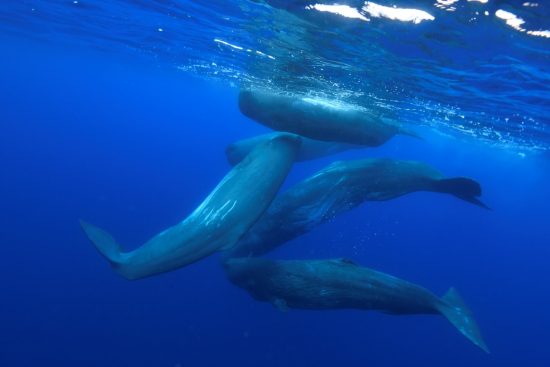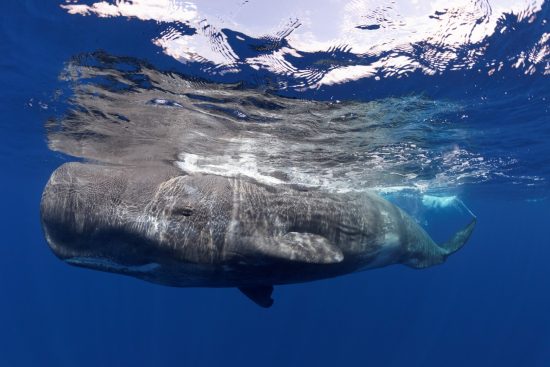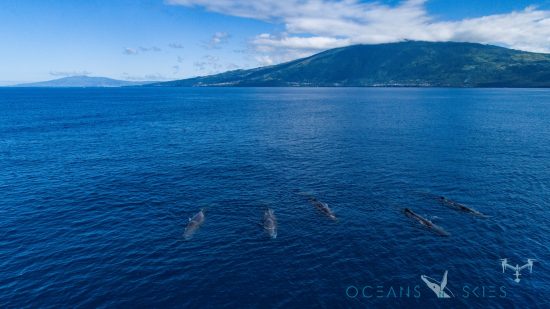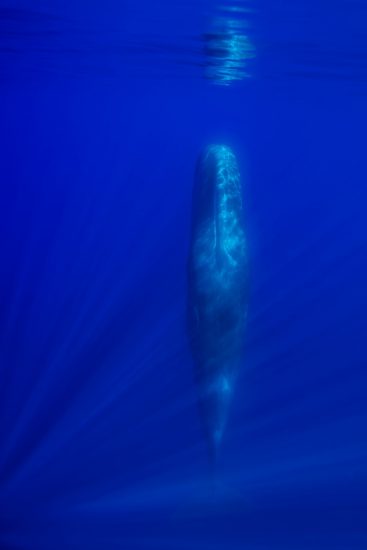






The unique location of the Azores, in a transition zone between the cold, nutrient-rich currents from the north and the warm Gulf Stream, makes the islands an oasis of marine life. In the area of the continental plates, cold, nutrient-rich undercurrents are transported to the surface, where they mix with the water warmed by the sun, ensuring a considerable nutrient supply. Since Pico is surrounded by a particularly small continental shelf, and the ocean often reaches several thousand feet deep at just three miles off the island, the sealife is already rich in the immediate vicinity of the coast.
In the summer especially, "smaller" mother whales visit the coastal regions of Pico with their calves. Sperm whales, long-finned pilot whales, blue whales and several species of beaked whales are the most abundant species in the Azores for most of the year. With a total of 25 species of whales and dolphins to be seen here, the Azores are the European hotspot for marine mammals. The probability of seeing whales or dolphins whilst out on a boat is a whopping 99%.
A small section of sea around the island of Pico is a marine reserve. In this area of the Atlantic, the water depth drops steeply to 2,000m and offers sperm whales the chance to hunt unimpeded on giant squid. On the surface, during the hunt, the rest of the whale family awaits the return of their mothers and fathers – it is a unique spectacle that you can watch from the whale watching boat. A special highlight is snorkeling with the largest predator in the world, though this requires a special permit from the local authorities that is reserved for professional filmmakers and photographers. Tourists diving and snorkeling with sperm whales is unfortunately not allowed in order to continue to protect the animals from mass tourism.
For 10 days straight, we were out on the open sea all day, 7 hours a day, searching for sperm whales. Of the 10 days, we had 2 days during which all the conditions were perfect for good shots from both the air and in the water. There were sperm whales that wanted to interact with us snorkelers, and we got in and out of the water from the Zodiac around 50 times a day for just a few seconds of video footage or a few photos. It was hard-earned material and everyone was exhausted after such a day at sea. On the last day, we had our big lucky day: no wind, no waves, sunshine and a whole sperm whale family with newborn calves, teenagers and full grown adults all around us.
Such an experience is what makes us proud to work with these animals. It is worth the time and money to experience these magnificent animals. The submerged nature around the island of Pico in the Azores allows you to experience an almost untouched island world in the Atlantic.
+ + The Azores, Europe's secret adventure islands in the Atlantic + +
Robert Wilpernig, Summer 2018
 Robert
Robert 25th March 2019
25th March 2019 Azores, Portugal
Azores, Portugal